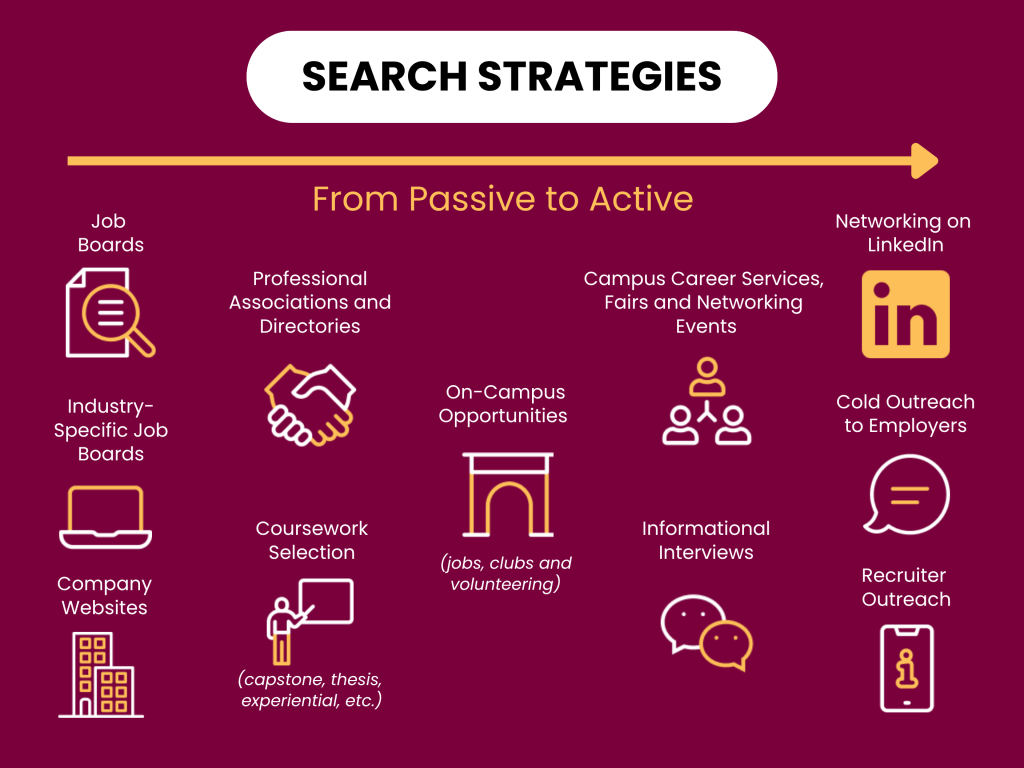Where Can I Find Experience?
In the previous chapter, you were introduced to the need for implementing a variety of search strategies to stand out in today’s job market. To recap:
- Passive job searching means you are waiting for opportunities to appear and responding to them—usually by submitting applications online and waiting for a response. While this approach can work, relying on it alone can put you at a disadvantage.
- To improve your chances, you need to be an active job seeker—someone who takes initiative, builds connections, and uncovers opportunities that aren’t always advertised. When you connect directly with people in your field, you give employers a chance to see your personality, motivation, and potential—things that don’t always come through in an online application.
This chapter will provide you with details and tips on how to apply these strategies to increase your chances of finding meaningful experiences aligned with your goals and interests.
Job Search Boards
Job search boards are the most commonly used search tool because they conveniently list available job opportunities across various industries and locations. Typically these boards let you search by experience type, location or keywords. Some may also let you upload your resume and apply directly on the platform. Some are general boards, listing all kinds of opportunities, where as others focus on specific industries or fields, allowing you to find more relevant and targeted postings.
Examples of Job Search Boards
Beware of employment scams.
Scammers may use job postings to trick job seekers, often with a position that seems just too good to be true (it might be!). Scam jobs may request money for training so that they get the account number to deposit wages, ask you to pay a vendor and reimburse you, and so on.
-
Pay close attention to any unsolicited emails. Refer to the “from” field to make sure it is a legitimate business email.
-
Keep your information private. Don’t give out your passport, social insurance number, driver’s license, health card, date of birth information or disclose your marital status.
-
Never send cheques, gift cards or money during a job application, interview or recruiting process. In Canada, you don’t have to pay a company to be trained for the job.
To learn more and receive support with employment scams visit, Mac’s Money Centre.
Company Websites
Company websites are another great source of job postings – they’re often one of the first places employers post new opportunities. If there’s an organization you’re interested in, visit their website and look for a webpage titled, “Careers,” “Work with Us,” “Join Our Team,” or “News.” For example, opportunities that can be found at McMaster University are posted on their Careers webpage (that also can be accessed through your Mosaic account under “Career Opportunities”).
If the company does not have their own job board, they may be posting their opportunities on their Instagram or LinkedIn page. Visiting company social media pages are not only create for finding job openings, but also hiring events they may be conducting, or behind-the-scenes content that gives you a feel for their workplace culture.
Professional Associations and Directories
Professional associations are a great source of industry specific information and often have job boards! Consider joining a professional association related to your discipline or industries of interest.
On-Campus Opportunities (Jobs, volunteering and Clubs)
As a student at McMaster, you have access to various on-campus opportunities and initiatives. Review the drop-down below to learn about the various resources and programs you may be eligible to participate in on campus!
Examples of on-campus opportunities
Coursework Selection
Make your courses work for you. Take advantage of the curricular experiences McMaster has to offer. Your course choices can do more than fulfill degree requirements—they can be a launchpad for hands-on experience, networking, and career clarity. Below are some considerations:
Campus Career Services, Career Fairs and Networking Events
In addition to job boards, department initiatives, course selection, McMaster’s career centres provide various services and events that can help you gain experience during your time at McMaster.
Spotlight of notable campus resources
Interested in gaining experience in research? The Office of Undergraduate Research is dedicated to supporting McMaster Science students enrich their education with hands-on experience in research. Visit their website to learn about their experiential courses, external and internal research opportunities, and advising services.
LinkedIn Networking
Follow companies, engage with posts, and message professionals in your field. A thoughtful comment or message can open doors. For more guidance on how to use LinkedIn, visit our chapter, How to Create a LinkedIn Profile.
Recruiter Outreach
Connect with recruiters who specialize in your field. They often have access to unlisted roles and can advocate for you with employers.
Information Interviews
Set up short, informal conversations with professionals to learn about their roles, companies, and career paths. These can lead to referrals or insider tips. Visit, Conducting Information Interviews, for more guidance.
Cold Outreach to Employers
Email or message hiring managers or team leads at companies you admire—even if no job is posted. Express your interest and ask about potential opportunities.
Quick Chapter Recap
- Apply various active search strategies: Don’t wait for opportunities to come to you, take initiative and use a mix of strategies.
Need more support with your search for experience?
Meet with a Science Career Advisor
Book a 30-minute appointment with the Science Careers & Experience Centre (BSB 127) in advance through OSCARplus.
Build your Science Career Toolkit with SCIENCE 2C00
Enrol in SCIENCE 2C00: Skills for Career Success in Science — for guidance on developing essential career skills and become eligible for co-op and experiential education opportunities.
Explore these additional chapters:
- Searching And Applying For Experience
- How To Create A LinkedIn Profile
- Introduction To Science Professional Competencies
- Creating Your Résumé And CV
- Writing A Cover Letter
Follow us on Instagram @McMasterSCEC
Stay informed on upcoming workshops, networking opportunities and career tips from peers, advisors and employers.


